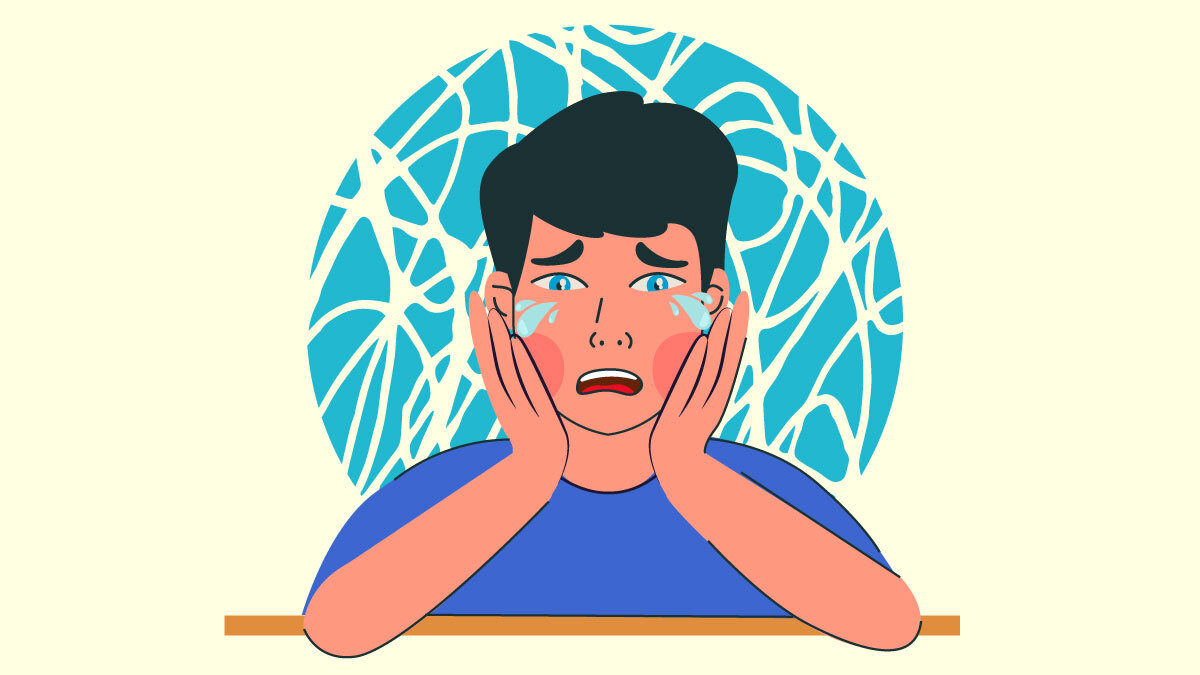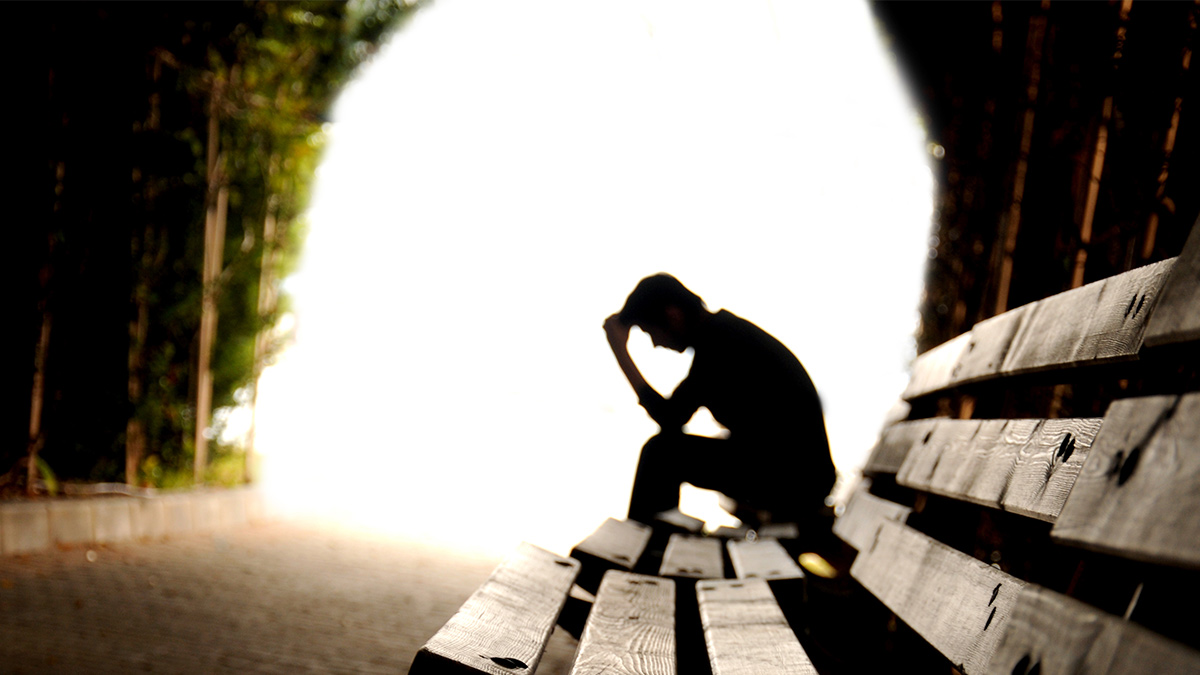Why Does Weed Make You Anxious And What Causes The Anxiety?

Most people love cake and cookies. People who are gluten-sensitive can’t eat them.
You go out drinking with friends. One has to be poured into an Uber after an hour.
Some people just feel like they caught a cold when they have COVID. Others may die.
Everyone is different, and everyone’s body reacts differently to viruses, substances, and other stimuli.
That’s the short way to explain why you may find that smoking weed is the perfect way to relieve the stress of a difficult day — but someone else may experience anxiety, paranoia, or even a panic attack.
The longer answer requires a look at what THC does in your body after you smoke some bud or have an edible.
Why Weed Can Give You Anxiety: The Role Of The ECS & Amygdala
If you’ve read anything about cannabis, you’ve probably heard about the body’s endocannabinoid system (ECS). It was only discovered by scientists in the late 20th century, but it’s the key to understanding marijuana’s effects.
The ECS is a chemical messaging system that regulates and controls most of the important functions of the body and the brain. The messages are transmitted by neurotransmitters called endocannabinoids, and they’re received by ECS receptors located throughout the body.
Weed, of course, contains cannabinoids like THC and CBD, and their molecular structure is almost identical to one of the important endocannabinoids produced naturally by the body. That allows THC (and CBD) to interact with ECS receptors — altering the regulatory messages being sent and received through the nervous system.
As it happens, there are lots of ECS receptors for THC to bind within the brain. And the densest concentrations of receptors are in the hippocampus, hypothalamus, and amygdala. The hippocampus is largely responsible for memory, learning, and navigation; the hypothalamus controls, among other things, hormone secretion and the body’s metabolism.
And the amygdala is essential for recognizing and controlling emotions — particularly anxiety and fear.
So when you smoke weed, its THC binds to receptors in the amygdala to have an effect on the stress and anxiety you feel. Some theorize that this extra flood of cannabinoids can overload and overstimulate the amygdala, causing emotions like anxiety or even fear.
That makes sense. But why do most people mellow out when they smoke, even though others may feel crippling anxiety?
The Release Of Neurotransmitters
Something else happens when THC binds to the brain’s ECS receptors. It stimulates the release of neurotransmitters like serotonin, dopamine, and GABA (gamma-Aminobutyric acid).
Serotonin and GABA block the release of another neurotransmitter, norepinephrine, which normally boosts anxiety levels. When serotonin and GABA lower levels of that neurotransmitter in the brain, people normally feel relaxed and calm.
Normally doesn’t mean always, though. In some people, a drop in norepinephrine levels causes a “rebound” effect. Other parts of their brains overreact by releasing the stress hormone cortisol, which increases anxiety and may even cause panic attacks.
What about dopamine? Increased levels of dopamine in the limbic forebrain have been associated — in some people — with the “formation of persecutory delusions.” In other words, paranoia.
That’s all interesting, but it still doesn’t answer the key question: why do only some people experience those negative effects?
We All Start From Different Places

Consider four weed smokers.
One is smoking for the very first time. Another is a regular smoker, with no pre-existing stress or anxiety issues. The others also smoke regularly, but are dealing with high levels of anxiety; one has generalized anxiety, the other is dealing with post-traumatic stress.
There are no guarantees, of course. But the first-time toker may experience some anxiety or paranoia because their brain has never had to deal with the effects of THC before. The “calm” smoker may feel relaxed and mellow as THC binds with the ECS receptors in their amygdala. One of the anxious smokers may find that weed makes them feel better, while the other feels worse.
That speculation is based on both anecdotal evidence and research studies.
There’s little question that smoking pot can provide short-term help for many people suffering from some form of anxiety. One large study found that those using medical marijuana reported a 50% reduction in depression and a 58% reduction in their anxiety and stress levels. Generalized anxiety disorder, OCD, and social anxiety disorder are among the types of anxiety likely to be helped by moderate marijuana use.
On the other hand, THC appears to worsen symptoms in patients dealing with some forms of stress and anxiety. People suffering from bipolar disorder or PTSD (post-traumatic stress disorder), for instance, are among those whose stress and anxiety levels have been shown to increase after weed use.
All of this information seems to raise as many questions as it answers. Let’s try to clarify what we’ve learned.
Variables Affecting Anxiety And Weed Use
It seems clear that most regular weed users, who aren’t already dealing with stress and anxiety, probably won’t find that toking up mysteriously makes them anxious or paranoid.
Evidence also shows that cannabis often helps to alleviate or ease anxiety in some smokers suffering from some forms of the condition — but is more likely to exacerbate symptoms in others. But why are there always exceptions?
It turns out that there are other variables that may determine who enjoys their smoke sesh, and who experiences anxiety.
The biggest variable appears to be the potency of the weed. Strains with high THC content are more likely to produce anxiety in users, probably because of greater levels of interaction with ECS receptors in the amygdala. Low-THC, high-CBD strains are less likely to cause anxiety or related effects; in fact, CBD has been shown to be a more effective approach to anxiety reduction than THC.
Other factors may also play a role in whether someone experiences anxiety or paranoia as a result of smoking cannabis. They include genetics (which may determine a person’s sensitivity to THC), sex (believe it or not, higher levels of estrogen appear to increase THC sensitivity), and personality.
The Bottom Line
The initial question, “Why does weed give you anxiety,” isn’t a completely valid way to frame a discussion of cannabis and anxiety. Weed does cause anxiety in some users — but decreases it in others, at least over the short term.
Those dealing with pre-existing anxiety disorders would be smart to discuss cannabis use with their doctor or therapist, to determine whether their issue might be helped or hurt by smoking weed. And those concerned about the possibility of becoming anxious (or worse) when they partake should consider focusing on weed strains with low THC content.
Why Does Weed Give You Anxiety? FAQ
Q: Do heavy smokers run a heavier risk of experiencing anxiety?
A: Yes, if they’re predisposed to experiencing it in the first place. The more THC that hits ECS receptors in the brain, the greater its effects will be.
Q: Is there any way to reduce the risk, other than smoking less potent strains?
A: Some believe the setting in which you smoke also makes a difference. A calm, comfortable environment, with supportive friends around, may help prevent any mild anxiety from becoming something more serious. It might also be a good idea to avoid edibles, which usually hit harder and last longer.
Q: Why would “naturally happy” people be less likely to experience anxiety while smoking weed?
A: There are two reasons. First, they don’t have existing anxiety or stress issues which could easily be worsened. Second, cannabis tends to “magnify” people’s personality characteristics. Happy people more commonly become even happier when they smoke up, while unhappy ones often get even more wrapped up in those feelings when they’re stoned.
References:
- Pertwee, R. G. (2006). Cannabinoid pharmacology: the first 66 years. British journal of pharmacology, 147(S1), S163-S171.
- Sallaberry, C. A., & Astern, L. (2018). The endocannabinoid system, our universal regulator. Journal of Young Investigators, 34(6).
- Rasia-Filho, A. A., Londero, R. G., & Achaval, M. (2000). Functional activities of the amygdala: an overview. Journal of Psychiatry and Neuroscience, 25(1), 14.
- Ramikie, T. S., Nyilas, R., Bluett, R. J., Gamble-George, J. C., Hartley, N. D., Mackie, K., … & Patel, S. (2014). Multiple mechanistically distinct modes of endocannabinoid mobilization at central amygdala glutamatergic synapses. Neuron, 81(5), 1111-1125.
- Barnby, J. M., Bell, V., Deeley, Q., & Mehta, M. A. (2020). Dopamine manipulations modulate paranoid social inferences in healthy people. Translational psychiatry, 10(1), 1-13. [1]
- Cuttler, C., Spradlin, A., & McLaughlin, R. J. (2018). A naturalistic examination of the perceived effects of cannabis on negative affect. Journal of affective disorders, 235, 198-205.[2]
- Botsford, S. L., Yang, S., & George, T. P. (2020). Cannabis and cannabinoids in mood and anxiety disorders: impact on illness onset and course, and assessment of therapeutic potential. The American journal on addictions, 29(1), 9-26. [3]
- Tambaro, S., & Bortolato, M. (2012). Cannabinoid-related agents in the treatment of anxiety disorders: current knowledge and future perspectives. Recent Patents on CNS Drug Discovery (Discontinued), 7(1), 25-40.
- Blessing, E. M., Steenkamp, M. M., Manzanares, J., & Marmar, C. R. (2015). Cannabidiol as a potential treatment for anxiety disorders. Neurotherapeutics, 12(4), 825-836.